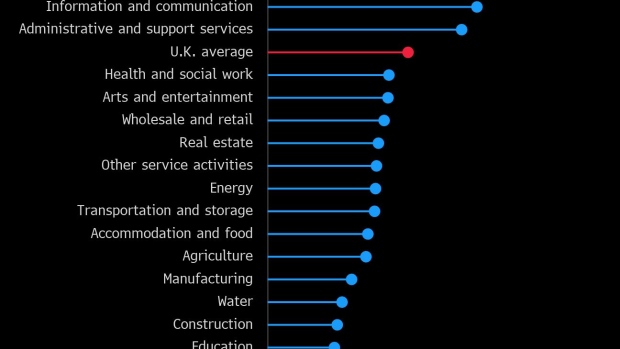May 3, 2022
U.K. Pay for Finance Workers Surges at Double the National Rate
, Bloomberg News

(Bloomberg) -- Pay for financial services workers in the U.K. has surged at double the pace for the rest of the economy since the pandemic began, widening inequality at a time when consumer spending power is being squeezed.
The Institute for Fiscal Studies calculated that average monthly pay in finance was 31% higher in February than at the end of 2019, above the 14% rate prevailing across all sectors. The median increase was lower still, implying that growth was concentrated among the highest earners in banking and insurance.
The findings will add to growing alarm over inflation, which is running at three times the pace the Bank of England targets, and fuel concerns about the poorest segments of society being left behind in a wage boom enjoyed by the some of the richest.
“This appears to be the first time since the financial crisis that financial sector have taken off like this, and it remains to be seen whether this is a one-off spike or a new trend,” Xiaowei Xu, senior researcher at the IFS, said in a statement released Wednesday.
Pay in finance has “dramatically pulled ahead” of the rest of the economy since October, the IFS said. It studied payroll data from Her Majesty’s Revenue & Customs department and the Monthly Wage & Salaries survey.
The findings capture the period in January and February when bonuses are usually paid and may overstate the long-term trend. The bulk of the increase since October was due to rising regular pay instead of bonuses and was driven by the highest earners.
Profit at the five biggest U.K. banks surged to a record last year on the back of active markets and the release of provisions they had set aside for pandemic-fueled loan losses that were averted as the economy rebounded.
The IFS said finance accounts for 29% of the top 1% of earnings and 44% who rank in the top 0.1%. It found few reasons that pay in the sector has broken away so quickly, noting that finance is no more reliant on immigrants from the European Union than the rest of the economy and doesn’t have higher rates of people over age 50 leaving the workforce.
“Earnings inequality has been falling for some years before the pandemic hit, with low-paid workers seeing the strongest pay growth,” it said. “The recent surge in pay among financial- sector employees, particularly the top earners, has led has led to a reversal of this trend.”
©2022 Bloomberg L.P.





